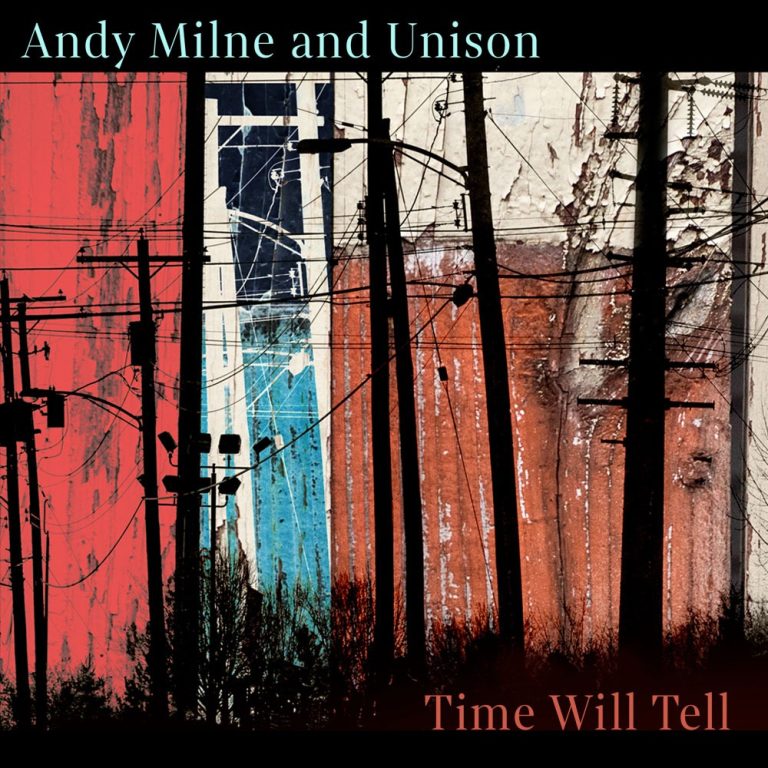2x JUNO Award Winner Andy Milne Chronicles His Lifelong Efforts To Uncover His Birth Family History In New Album, Time Will Tell
Time Will Tell chronicles Andy Milne‘s lifelong efforts to uncover his birth family history. Adopted as an infant, his efforts to connect with his birth family proved fruitless – until 2018, when the gift of an Ancestry.com DNA test from his wife, singer La Tanya Hall, changed everything.
A DNA match led him to his first cousin, Marc, with whom he discovered he shared a mutual friend. Ironically, just as world events collided with the COVID-19 lockdowns, the profound mysteries of his biological family began to rapidly reveal themselves.
“In 2022, my voyage eventually received an unimaginable upgrade when I finally met my birth mother,” he recounts. “This recording reflects part of my expedition navigating the mixed emotions associated with this identity paradox. How we move through life, and the lives we will touch, is unknown to us, despite our best efforts to chart a path.”
While he says the new album shouldn’t be taken as a pound-for-pound musical account of these experiences, the journey inspired and informed his process.
“I realized my compositions were a subconscious reflection of my experience,” says Milne, who is also an assistant professor of music at the University of Michigan. “I met my birth mother days before I composed a lot of this music, and quickly recognized that this would be a significant throughline in those pieces. I essentially allowed it to flow and envelop my process.”
The notion of “family” extends to Milne’s artistic approach, in terms of his commitment to honoring relationships, building community, and blending musical languages. This is heart-wrenchingly expressed in the track “Lost and Found.” It reveals his personal mission — both in the title and his plaintive performance – and introduces a new texture to Unison’s soundscape in the koto of virtuoso Yoko Reikano Kimura. She can be heard on three other tracks on Time Will Tell.
Milne’s interest in Asian culture dates back to his student days when he also became curious about Zen Buddhism. A decade ago, he fell in love with the string universe of the Japanese koto and created the multidisciplinary project Strings & Serpents, which featured a piano duo, a koto duo, and an animated film. This led to him inviting Kimura to join Unison for a gig.
“That set the wheels in motion,” he recalls. “I like the koto for its soulfulness and because it can express opposite and complementary sonic qualities to the piano. It’s quite flexible – it can be delicate but it can also be really ferocious. The similarities and differences between these two iconic string instruments really appeal to me.”
Also bringing considerable chops to four tracks is tenor saxophonist Ingrid Laubrock, with whom Milne recorded the 2022 album Fragile. Their interplay on the opening track “Purity of Heart” lends a sense of urgency to the proceedings, and after their previous collaboration, the ease of their give-and-take is apparent.
“Ingrid and I have known each other for years, and in 2012, we had a transformative experience training together at the Jazz Composers Orchestra Institute at UCLA,” Milne explains. “Then, during the pandemic, she reached out and invited me to make a duo recording. It was challenging, inspired, and a lot of fun, and we realized we had forged a very good musical connection.”
Echoing Milne’s winding personal journey, some tracks on Time Will Tell are journeys themselves, marked by dramatic shifts in tempo and tone. “Beyond the Porcelain Door” and “Kumoi Joshi” are striking examples.
“In traditional jazz song form it’s perhaps less common for compositions to express two tracks in one,” he explains. “With some of this music, when you hear the beginning of the track, you really can’t tell how it will end. On one level, I know I was reflecting and channeling the power of the unknown as it related to my journey connecting with my birth family. There is a certain amount of freedom that comes from being committed to yourself and your process that allows you to feel comfortable making these choices.
Having been around the sun a few times and having composed a lot of music, I find it empowering to trust my instincts, be bold and move things around. It’s a spiritual expression of being in a place where this is not only permissible, but natural and organic.”
Milne continues to enjoy a strong sense of brotherhood with Hébert and Penn, who each contribute a composition to Time Will Tell. Penn wrote “Papounet” – the title being his children’s term of endearment for their grandfather – which features some of the trio’s most synchronous and adventurous playing. Meanwhile, Hébert provided “Broken Landscape,” which gives the bassist ample space to virtuosically explore color, soloing almost throughout against the backdrop of Penn’s evocative brushwork.
“I’ve always felt a strong musical kinship with these guys,” Milne notes. “It was key that their voices as players and composers come through, expressing how the music could go in a way that it’s their vision as well. It’s important to me that even when our collective vision reaches across aesthetic boundaries, a framework exists that supports a cohesive coexistence of our voices and approaches – like family.”


